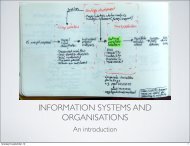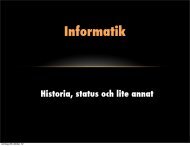Flensburg P: Personlig databehandling - Per Flensburgs hemsida
Flensburg P: Personlig databehandling - Per Flensburgs hemsida
Flensburg P: Personlig databehandling - Per Flensburgs hemsida
You also want an ePaper? Increase the reach of your titles
YUMPU automatically turns print PDFs into web optimized ePapers that Google loves.
<strong>Per</strong> <strong>Flensburg</strong>: <strong><strong>Per</strong>sonlig</strong> <strong>databehandling</strong><br />
The data processing department was supposed to answer questions concerning the<br />
tools, at least the more technical ones. I thought, however, it was important to ask the<br />
users too, because in using the tools they might have gained this kind of knowledge,<br />
perhaps at a higher degree than people from the data processing department. It was<br />
also possible to compare the description of the use of a certain tool, first as the vendors<br />
described it, and second the description of its actual use.<br />
Concerning the organization, that uses the tools, I have almost only considered fairly<br />
large organizations, which already had a working data processing department. The<br />
idea of user development had often come via the concept of the "information centre"<br />
as IBM (1982) suggested it. Mostly only a few people in the data processing department<br />
were working with user development. In small organizations it seemed to be<br />
only the manager that used the tools, mostly for calculation purposes. But I have only<br />
studied four such organizations.<br />
The historical background was very important. It helped me better understand the<br />
phenomena I come across in the investigation. However, different people gave different<br />
interpretations of what happened and why it happened. I also came across some<br />
integrity problems, which of course were respected. Sometimes people did not know<br />
much about the story prior to their appointment, since they were employed to work<br />
with the computer system and thus they had not joined the organization until the<br />
system was in use. In this case I was forced to use second hand information.<br />
I have used the framework of Mumford (1983a,b) concerning job satisfaction and<br />
asked people about effects on their job skill, their social relations, their psychological<br />
needs, their ethical dilemmas and their task structure.<br />
An important organizational property was the possible support for decentralization in<br />
the organization. This could be one organizational effect. Another might be conflicts<br />
between data departments or user groups or information centre people.<br />
The set of questions has been worked out in two steps. First two of my students made<br />
investigations in two companies, without any question set. Their conversations with<br />
the people in the companies were written down almost verbatim. I thus obtained a<br />
good impression of what took place. A certain pattern emerged: Historical description,<br />
actual application, properties of the tool and organizational effects were the<br />
main points. However, people did not say anything about the effects on job satisfaction.<br />
<strong>Per</strong>haps they were unaware of them, so I supplied a set of questions relating to<br />
this area. Then I made a test interview myself and found the total set of questions<br />
useful. I also prepared a guide with a more detailed discussion of every question and<br />
explained my intention with the questions and the type of answers that I expected. I<br />
also tried to foresee the difficulties and identify possible ways of overcoming them.<br />
The purposes of this guide was twofold:<br />
• To act as a guide for other researchers or students that were going to help me in the<br />
investigation.<br />
190







